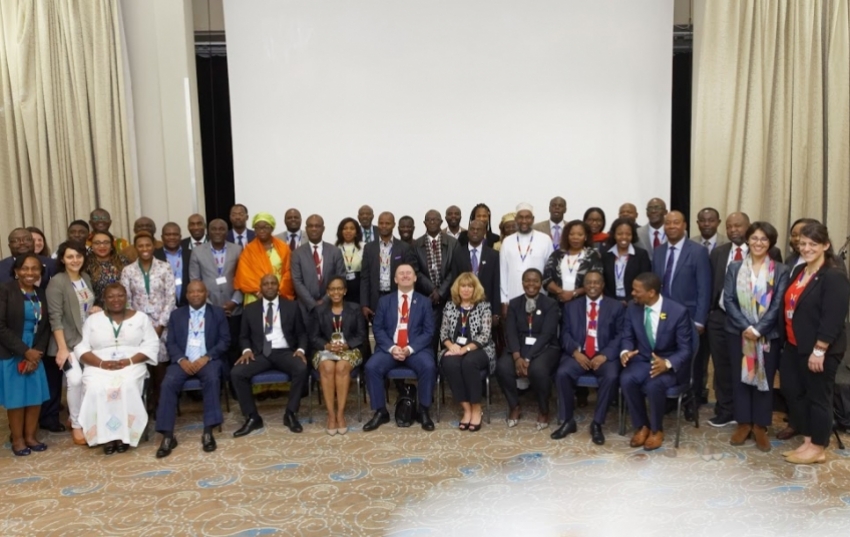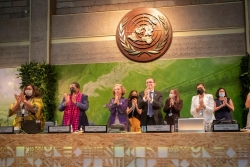And by this, ensure a demand-driven transition to the low emissions development pathway in Africa, into the long-term future.
This meeting was timely. Africa being among regions that has most ratified their climate action commitments under the Paris Agreement – popularly referred to as Nationally Determined Contributions (NDCs), urgently needs to smoothen out implementation pathways in the context of prevailing socioeconomic priorities. For this, the Africa LEDS project stands out a flagship initiative that demonstrated how countries can establish a structure for optimal implementation where both climate and socioeconomic benefits are maximised.
A number of key stakeholders participated in this gathering – specifically, the countries that implemented the project, non-participant countries – all being AMCEN member states, a representative from the European Union – which financed the project, representatives from the African Union as well as the United Nations Environment Programme which was the lead implementer.
Country testimonials on what the project did was the major highlight. Speaking on behalf of Cameroon, the county’s Secretary General in the Ministry of Environment, Ms. Prudence Galega, noted that thanks to the project, the county’s capacity for bridging science – policy – implementation gaps in NDCs implementation was enhanced on multiple levels.
The first level was the country’s expertise for climate modelling. This she noted was enhanced to go beyond forecasting silo environmental impacts, to simultaneously forecast climate and socioeconomic impacts – which for the first time, aligns the country’s investments in realising the economic development blueprint, the vision 2035, with climate actions.
The second level was the youth. She noted that thanks to the project demonstrating the enterprise opportunities of climate action and NDCs in sectors beyond the environment, such as ICT, which engages most youth, the project attracted participation of youth. Specifically, youth with ICT skills in software development were engaged and guided to adapt these skills towards developing analytical tools that inform on optimal pathways to implementing NDCs – where both climate and socioeconomic aims are maximised. She noted that through this trajectory of demonstrating enterprise benefits in climate actions and NDCs, where multiple sectors are converged, Cameroon could create 5 million more assorted jobs in multiple sectors – including its agro-value chains as core and complemented by ICT, clean energy & transport. This is relative to a business as usual approach of considering environment as a silo undertaking and sectors in disparate silos.
The point of engaging youth was a major discussion point with non-participant countries who wanted to know how youth could be attracted to create enterprises through climate action. To which the response was – the continent urgently needs to divest from seeing climate action as a silo – and the Africa LEDS project approach provides an example of how this can be structurally actualised. It is worth noting that each year, over 12million youth join the labour market in Africa to compete for just 3million jobs – and having NDCs as practical tools for jobs and enterprise creation is a matter of significant interest to Africa.
Ms. Galega concluded by noting that the project structure was now informing development planning at both national and sub-national levels where the government is actively implementing reforms on decentralised development.
Zambia’s representative from the Ministry of Water Development, Sanitation and Environmental Protection, speaking on behalf of the minister Hon. Dr Dennis Wanchinga, highlighted that their NDCs are packaged within the context of the country’s high-level economic development blueprints - the seventh National Development Plan and Vision 2030. He noted that these are to ensure that Zambia attains high middle-income country status by 2030 and that they consider NDCs as additional tools for achieving their socioeconomic imperatives and their approach synergises both adaptation & mitigation.
He noted that the project supported the country put in place a modelling and policy structure that will ensure NDCs optimally drive realisation of their socioeconomic imperatives. He added that this has been taken up by the council of ministers as provided for in the Zambia National Policy on Climate Change and that the results are on track to inform updates to their NDC commitments especially in small-scale renewable energy and forest regeneration.
He also noted that through the project, Zambia’s capacity for bridging science – policy – implementation gaps had been enhanced, primarily from the dimension of ensuring that what environment stakeholders do, ends up informing and contributing to mainstream socioeconomic development in the country.
Ghana’s representative speaking on behalf of the Minister of Environment, Science, Technology & Innovation Hon. Prof. Kwabena Boateng noted that the project was timely in bridging gaps in a key area of the country’s social development – domestic energy. He noted that while the country has made strides in enhancing electricity access to over 80% of households, it was lagging in domestic cooking energy which sees over 70% of its population rely on firewood and charcoal and use of inefficient stoves. Addressing this he noted is a critical priority for the country, considering its implications across various segments – including forestry, climate change and health. He noted that thanks to the project, Ghana has established a modelling structure to objectively inform investments of the country’s ongoing policy trajectory of clean cooking. He noted that such a trajectory has potential to ensure Ghana recovers at least 12,000 ha of degraded forest lands every year, sequester 85% more carbon and generate over 6 million direct jobs up to 2030. On the social front, he noted that adoption of clean cookstoves and its reduction of indoor pollution was projected to reduce deaths by over 1,400 per year by 2030.
In addition to these countries, representatives from Cote d’Ivoire, Kenya, and Mozambique spoke – each lauding the Africa LEDS project for enhancing the capacity of their respective countries for bridging science-policy-implementation gaps towards ensuring NDCs implementation unlock socioeconomic benefits prioritised by the countries.
In thanking the EC for investing in low emissions development in Africa and UNEP for its technical support, countries called for the urgent need to replicate successes of the Africa LEDS project continentally as the framework for NDCs implementation in Africa.
The European Commission represented by Ms. Astrid Schomaker, the Director for Global Sustainable Development thanked UNEP for its technical support to member states and lauded the countries for their participation in the project. She noted that NDCs implementation can become strategic for much needed enterprise development and industrialization in the African region and indeed the globe – but with the critical added advantage of not following high carbon development pathways. She added that while this was not easy, it remained achievable and a critical component to this end is analytical models, tools and strategies to inform optimal investment policy decisions. She thanked countries for demonstrating this possibility and pledged that such demonstration of tangible socioeconomic and enterprise benefits of NDCs was a major incentive for continue EC investment in low emissions development in the continent.
On her part, the UNEP Deputy Executive Director Ms. Joyce Msuya thanked countries for implementing the project and the EC for its partnership that goes beyond projects to strategic level engagement of member states. She further noted that to support transition of successes of the Africa LEDS project from project level towards scaling, where it becomes a framework for NDCs implementation, it was important to answer the how questions. She further noted that such a transition required clarity in establishing what worked and what did not work. She also added that appreciating the differing country contexts was critical to scaling these successes across the continent.
Through this ministerial breakfast, the “Accra Action Agenda on Low Emissions Development Strategies (LEDS) For Africa”, adopted by state and non-state actors from project and non-project countries during the project close-out meeting was affirmed. This is therefore a call to governments across Africa to create an enabling environment for investments in low emission development as demonstrated by the Africa LEDS Project, and by this ensure that NDCs become an additional tool in the quest for accelerated socioeconomic progress.
Register to become an Innovative volunteerism actor at : Registration link (Click)
Join our continental platform of agro-industry actors and fill your GAP at : Registration link to join MeBAFOSA (Click)
https://www.ebafosa.org/index.php/mediaa/item/859-amcen-ministerial-breakfast-dialogue?print=1&tmpl=component#sigProId3122f7849c







